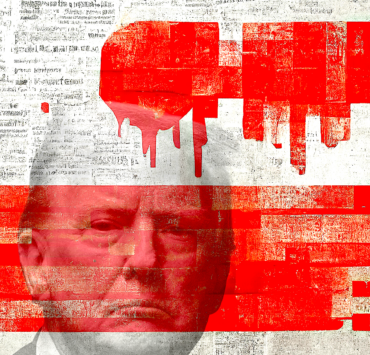
POLITICS
Kimberly Marsh
Illustration, The Oklahoma Eagle
In the latest bid to inform voters and encourage voter turnout in the Tulsa mayoral election on Nov. 5, the Tulsa World held a debate between the two candidates – St. Rep. Monroe Nichols (D-72) and County Commissioner Karen Keith – on Oct. 22.
The face-off grew tense at times, with the candidates voicing their views on issues ranging from the use of dark money in campaign advertising to how their leadership of the city would change Tulsa. The forum, held at the Lorton Performing Arts Center at the University of Tulsa, was one of many debates, community discussions, and forums since the Aug. 27 mayoral primary to generate more interest from Tulsans in their city government.
Only 26 percent of all Tulsa voters – just over 56,000, participated in the mayoral primary. The primary resulted in a runoff of Nichols and Keith. Both are Democrats and have city government experience and similar views on many topics. However, as they vie for the job to lead Tulsa, their styles and approaches are different. Facing off on stage head-to-head, it was clear that both democrats are seeking to draw in Republican voters. Businessman Brent Van Norman, who ran for mayor on the Republican ticket, was eliminated in the August primary.
In the Oct. 22 event, three leading Tulsa journalists, Tulsa World staff writer Kevin Canfield, Tulsa World editorial team lead Ginnie Graham, and The Oklahoma Eagle Managing Editor Gary Lee, participated in the panel.
Mayor G. T. Bynum, who served two four-year terms, will leave the job for the private sector in January. Either Nichols or Keith will replace him. While more than 70 percent of Tulsa’s eligible voters declined to vote on Aug. 27, more are expected to vote in the general election because it includes the hotly contested bid for United States president between former President Donald J. Trump and Vice President Kamala Harris. Thus, more than 200,000 voters are expected to hit the Tulsa polls.
Informing Tulsa Voters
Despite the rush of debates and public events featuring Keith and Nichols and the fact that both have been in crucial governmental leadership positions for Tulsa County and the City of Tulsa over the last 20 years, many Tulsans will not know who they are. Thousands of Tulsans will have yet to read local accounts in The Oklahoma Eagle or other papers, seen local television interviews, or attended community forums and meetings. They may fill in a box on the ballot without knowing anything about either candidate. They may choose a name because they have seen it on a sign, remember it from previous campaigns, select one for no good reason, or leave the box blank.
To learn more about the mayoral candidates, go to monroeformayor.com and karenkeith.org. Both have Facebook pages, where you can see them in action and also provide commentary on each candidate, mostly from supporters of either candidate.
Candidates Address Issues
During the Oct. 22 debate, the three panelists sought to ask questions that community members had voiced.
Keith was asked to answer questions as to why the Tulsa County Commissioners did not do something earlier about the alleged abuse at the Family Center for Juvenile Justice that prompted a lawsuit filed by 20 juveniles alleging abuse and neglect. She maintains that the abuse was revealed to the commissioners for the first time in April of 2024, just as the municipal campaigns were in full swing.
The TU Lorton Performance Center crowd met her replies with groans, showing a continued concern about the facility owned by Tulsa County but operated by Tulsa County judges according to state law, Keith said. On July 19, by unanimous vote, the commissioners took over administrative duties of the center and appointed David Parker to oversee the center. Parker reportedly worked in the Oklahoma Department of Corrections for 30 years before he oversaw the David L. Moss Adult Detention Center from 2017 to 2020.
Keith maintains that none of the commissioners knew about the alleged abuses until it was revealed publicly. Nichols maintains that the Tulsa County Commissioners knew earlier but did not act then.
Both candidates were asked about bad advice they have been given during the campaign and how they would be more discerning in what advice they take as Tulsa’s mayor.
In her response, Keith chose to draw attention to the “dark money” flier, waving it in the air and accusing Nichols of supporting the use of “dark money” to create false messages about her. The mailer echoed sentiments that Nichols has made publicly as well: “Karen Keith is still ignoring widespread rape, molestation and abuse of children. Karen Keith Failed our Community and Betrayed Our Trust.”
She called out the Nichols campaign for being behind the circulation of the mailer as well. Nichols denied any involvement, saying he was unaware of the flier until he saw it just before the debate.
The circulation of the flier is a sign of just how contentious and competitive this race is between two similar Democrats who have strong support from members of their own party. Keith strongly advocated for opening a new, larger center for juveniles within the Tulsa County Court system, with many upgrades. The controversy now centered on the abuses alleged by detainees has become her Achilles heel in this campaign.
The flier is sponsored by The Oklahoma Project, a political action committee based in Oklahoma City, which also has ramped up campaigns against state Republican leaders (facebook.com/theoklahomaproject/). “Dark money” refers to organized campaigns created privately to influence elections, public policy, and political discourse. The source of the money is not disclosed to the public.
Keith said that the commissioners who are defendants in the case would likely be dismissed because they were not responsible parties for operating the center over a 50-year period. It was the unsupervised juvenile justice court judges. The oversight was changed after April, and Keith said the new management group has been open, granting tours to media and others to show their actions.
Nichols Responds To North Tulsa Topics
Nichols was asked about issues important to Tulsa’s Black community, questions surrounding future work on reparations, and support for re-routing the I-244 highway bridge that served to remove Black Wall Street businesses and buildings and divide the district. Lee said the questions for Nichols stemmed from discussions with other state legislators and Tulsa community leaders. In response, Nichols said he has been a workhorse for community issues, even if he is not always a “show horse” at rallies. He admitted that reparations are not the biggest issue in his campaign, as so many other concerns impact the community that can be addressed in the first 100 days of office based on plans posted on his website that he continually refers to in public settings.
In this debate, the questions were tailored to the candidate based on issues that have arisen as community priorities during their campaigns. Some Nichols supporters questioned why the reparations question was posed only to Nichols and not to Keith, accusing the hosts of “insinuating that Nichols is not Black enough” because he hasn’t placed reparations at the top of his platform.
But Nichols gave an answer consistent with what he had said privately. Reparations, in particular, are not at the top of his agenda. He will support what the community advocates for the removal of the I-244 highway crossing through Greenwood. He will rely on other highly capable, experienced community leaders who are carrying the ball on these issues. If he is elected as Mayor, he said he will rely on other community leaders, sometimes through delegation, to lead certain issues while he tends to City executive business and personally advocates for various issues and policies as needed.
Keith has not made reparations an issue in this campaign, and she does not have a strong response when asked about issues prioritized by Black Tulsans. Keith talks about the importance of remembering the history of Greenwood and privately discusses a few items she is considering that could help the Greenwood District.










